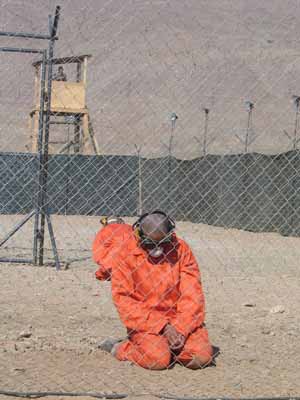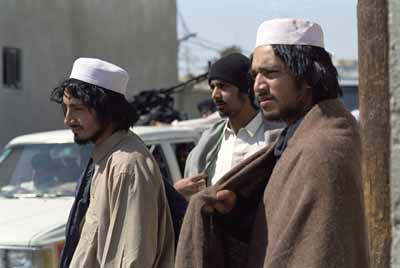

One of the most controversial aspects of the United States' war on terrorism is its treatment of enemy combatants. According to the Bush administration, terrorists are not the same as the typical enemies in conflict. They do not necessarily fight for one country, and do not follow normal conventions as war. Thus, much to the protest of human rights organizations, news organizations, and many in the government, the administration and the military have sequestered many of who they allege are the worst offenders in Guantanamo Bay, Cuba. Until recently, their identities were unknown, their charges were unknown, their relatives were not notified of their presence, and they were not given due process.
This is troubling material, regardless of one's political affiliation. What if somebody at Guantanamo was innocent of charges? There are endless sound bytes from George Bush and Donald Rumseld remarking how evil these prisoners were. But what if they are wrong? And it's no longer a matter of if. Over the past year, prisoners from Guantanamo have been released. A few weeks ago, five Chinese Muslims were finally released from the camp. They were deemed innocent, but could not return to China lest they face possible death from the government (Albania took them in). Where is their recourse for over two years in the camp? What about everybody else released? They were never charged, and now have lost years of their life. This brings us to the Tipton Three.
Road to Guantanamo begins a bit slowly. These are just ordinary guys going on vacation. The intensity of the movie ramps up as they move from Afghanistan to Cuba. US interrogators ask the same questions and provide no answers. They subject them to what can arguably be considered torture, both mental and physical. The constant interrogations make for tough watching, especially given the fact that the three were never charged. One was on parole, and had to check in constantly with the police the time he was supposedly in Afghanistan. Another was employed at the same time. How hard could it be to check on their stories? Especially given the weight of the situation.
Winterbottom and Whitecross present their case ambiguously. This way, the viewer can experience the same confusion that the Tipton three felt. They are thrown into a horrific situation, and do not know how to deal with it. However, the co-directors dance around some of the basic facts of the case. By not letting the three simply state their reasons definitively, Winterbottom and Whitecross lose an opportunity to make their case stronger. As it is, Road to Guantanamo is still a strong film, just not as strong as it could have been.